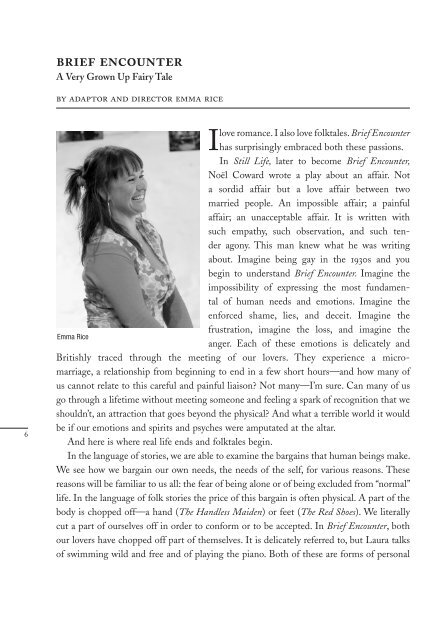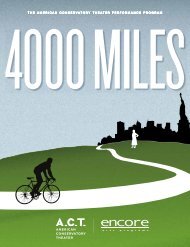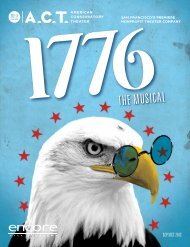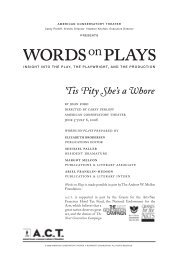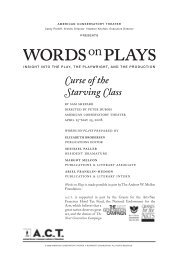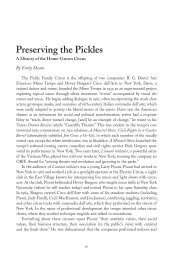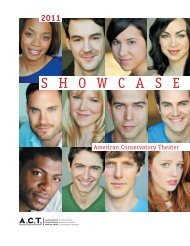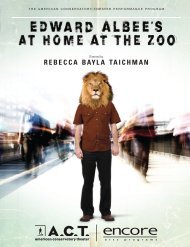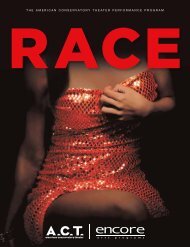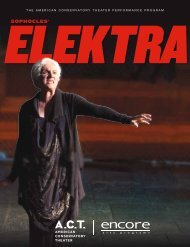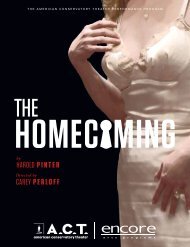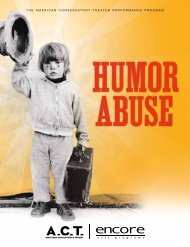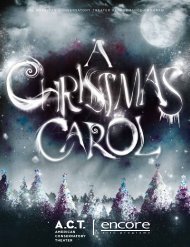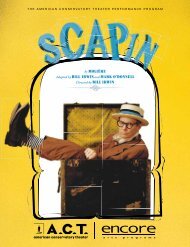Noël Coward in Brief Encounter - American Conservatory Theater
Noël Coward in Brief Encounter - American Conservatory Theater
Noël Coward in Brief Encounter - American Conservatory Theater
Create successful ePaper yourself
Turn your PDF publications into a flip-book with our unique Google optimized e-Paper software.
6<br />
brief encounter<br />
A Very Grown Up Fairy Tale<br />
by adaptor and director emma rice<br />
love romance. I also love folktales. <strong>Brief</strong> <strong>Encounter</strong><br />
I has surpris<strong>in</strong>gly embraced both these passions.<br />
In Still Life, later to become <strong>Brief</strong> <strong>Encounter</strong>,<br />
<strong>Noël</strong> <strong>Coward</strong> wrote a play about an affair. Not<br />
a sordid affair but a love affair between two<br />
married people. An impossible affair; a pa<strong>in</strong>ful<br />
affair; an unacceptable affair. It is written with<br />
such empathy, such observation, and such tender<br />
agony. This man knew what he was writ<strong>in</strong>g<br />
about. Imag<strong>in</strong>e be<strong>in</strong>g gay <strong>in</strong> the 1930s and you<br />
beg<strong>in</strong> to understand <strong>Brief</strong> <strong>Encounter</strong>. Imag<strong>in</strong>e the<br />
impossibility of express<strong>in</strong>g the most fundamental<br />
of human needs and emotions. Imag<strong>in</strong>e the<br />
enforced shame, lies, and deceit. Imag<strong>in</strong>e the<br />
frustration, imag<strong>in</strong>e the loss, and imag<strong>in</strong>e the<br />
Emma Rice<br />
anger. Each of these emotions is delicately and<br />
Britishly traced through the meet<strong>in</strong>g of our lovers. They experience a micromarriage,<br />
a relationship from beg<strong>in</strong>n<strong>in</strong>g to end <strong>in</strong> a few short hours—and how many of<br />
us cannot relate to this careful and pa<strong>in</strong>ful liaison? Not many—I’m sure. Can many of us<br />
go through a lifetime without meet<strong>in</strong>g someone and feel<strong>in</strong>g a spark of recognition that we<br />
shouldn’t, an attraction that goes beyond the physical? And what a terrible world it would<br />
be if our emotions and spirits and psyches were amputated at the altar.<br />
And here is where real life ends and folktales beg<strong>in</strong>.<br />
In the language of stories, we are able to exam<strong>in</strong>e the barga<strong>in</strong>s that human be<strong>in</strong>gs make.<br />
We see how we barga<strong>in</strong> our own needs, the needs of the self, for various reasons. These<br />
reasons will be familiar to us all: the fear of be<strong>in</strong>g alone or of be<strong>in</strong>g excluded from “normal”<br />
life. In the language of folk stories the price of this barga<strong>in</strong> is often physical. A part of the<br />
body is chopped off—a hand (The Handless Maiden) or feet (The Red Shoes). We literally<br />
cut a part of ourselves off <strong>in</strong> order to conform or to be accepted. In <strong>Brief</strong> <strong>Encounter</strong>, both<br />
our lovers have chopped off part of themselves. It is delicately referred to, but Laura talks<br />
of swimm<strong>in</strong>g wild and free and of play<strong>in</strong>g the piano. Both of these are forms of personal


